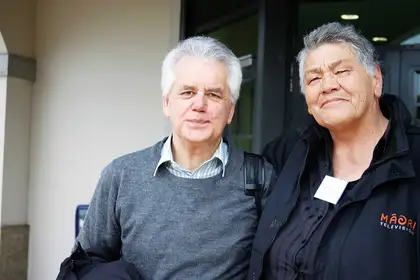
Moana Jackson and Mereana Pitman, who gave keynote speeches at a conference on social change at Massey.
Progressing Māori interests and values under the Treaty of Waitangi requires bravery, persistence and working with love, says well-known Māori lawyer and expert on indigenous constitutionalism Moana Jackson.
He was keynote speaker at conference on social change at Massey University’s Auckland campus last week.
The theme of the Social Movements, Resistance and Social Change conference was: Ka whawhai tonu mātou: Beyond capitalism - beyond colonisation.
The need for a long-term approach to bringing about significant changes in addressing inequality and social justice issues was highlighted at the event, says organiser Dr Warwick Tie.
Continuing to ask questions and to challenge lies and myths in order to understand the truth about our past is critical in moving forward as a nation, Mr Jackson said in his joint keynote speech with Treaty of Waitangi educator and activist Mereana Pitman.
He delved into the violent impact of colonisation and the overlaying of Western political ideologies on indigenous cultures. The Treaty of Waitangi provides a constitutional and ideological basis for different models and power structures beyond capitalism or socialism, he added, with reference to “rangatiratanga for Māori to make their own decisions, kawanatanga – the right for Pākehā to make their own decisions ”.
Ms Pitman discussed her journey as an activist in the Māori Land Rights movement, and her concern at the widespread lack of knowledge of key figures and episodes in the history of Māori resistance, such as Parihaka, and the plight of Ngāi Tūhoe.
And while people tell her to “move on” from reflecting on the past, she says Māori need the freedom to assert their voice and independence in the running of the country.
“I can’t change the way white privilege works, but I can change the way our children respond to that.”
Conference hit the mark with youth
Dr Tie, a sociologist in the School of People, Environment and Planning at Massey, says the conference attracted many younger people – a positive sign that counters the accepted view that youth are not interested in political issues.
Presentations on topics relevant to election issues currently being discussed in the media included poverty and economic inequality, as well as our prison system. Speakers tended to focus on long-term social transformation rather than narrower, shorter-term perspectives framed by election cycles, he says.
One of the key workshops was on the work of Matike Mai Aotearoa, a movement for constitutional transformation based on a model that brings together Māori and Pakeha worldviews.
Themes explored in panel discussions and workshops included animal rights, democracy and power, colonisation to decolonisation; social change at work, Māori immersion teaching and struggle for the [te reo Māori] language identity and class politics, Treaty-based health practice, white privilege, and decolonising the ivory tower.
The conference agenda was framed around the following ideas and questions:
- As political, economic and ecological crises deepen so does the urgency of our need to find new ideas and new methods of organising
- What are the brightest ideas and models emerging from our activist work and from our research?
- How do we affirm Te Tiriti o Waitangi while conceiving and working for a future beyond capitalism and colonisation?
- How do we find new, effective ways of co-producing knowledge from across the academic-activist divide?
Other conference highlights were the launch of Counterfutures: Left Thought and Practice journal (Issue four), as well as a book launch for Precarity: Uncertain, insecure and unequal lives in Aotearoa New Zealand (Massey University Press).
The conference was initiated by Massey University four years ago, and hosted this year by Massey and Economic and Social Research Aotearoa (ESRA).